| |
 |
STUDY IN UAE |
|
|
|
 |
STUDY
IN UAE - DUBAI, ABU DHABI, SHARJAH, RAK, AJMAN, FUJAIRAH |
| |
|
|
| |
| Welcome to Arabian Campus - Study in UAE |
|
The following web pages provide guidance to students wishing to study in UAE.
The following information is provided:
General Information about United Arab Emirates
UAE's Educational System
What's it like studying in UAE
How to get to UAE
Information about living in UAE
List of Embassies and Consulates in UAE
Other links, such as Government Offices, Newspapers, etc.
List of univerisites and colleges in UAE and their programs
A comprehensive list of schools in UAE
List of training institutes in UAE |
| |
 |
| |
|
|
| |
 |
| |
The Sharjah Commerce and Tourism Development Authority
participates in the
Sharjah International Book Fair 2017 |
| |
SCTDA launches three new books on tourism and architecture
in Sharjah at the 36th International Sharjah Book Fair |
| |
H.E. Khalid Jasim Al Midfa: The Authority confirms its dedication to providing the best information and services to visitors |
| |
Sharjah Commerce and Tourism Development Authority (SCTDA) is participating in the
36th Sharjah International Book Fair
which started on November 1 and will run till November 11 at Sharjah Expo Center.
The Sharjah International Book Fair is the fourth largest book fair in the world,
attracted 2.6 million visitors last year from the region and around the world. |
| |
During the event this year, the Authority exhibits in a pavilion showcasing the sophisticated design of Sharjah's cultural and tourism offerings, where SCTDA launched three books;
‘Sharjah’s Architectural Splendour’, which gives prominence to the landmarks of Sharjah with impressive images and information on these architectural highlights in Arabic and English;
‘Sharjah Visitor’s Guide’ - a mini guide for tourists detailing all of Sharjah’s landmarks, attractions and events with up-to-date maps and information in both Arabic and English, and the
‘Sharjah Destination Toolkit’ a comprehensive overview of Sharjah in English geared towards tourism industry professionals. |
|
|
|
|
|
|
| |
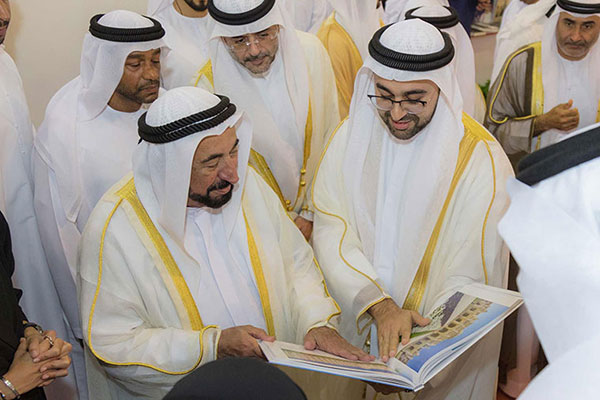 |
| |
|
| |
His Excellency also noted that with the launch of three new books, the Authority substantiates its dedication to providing the best information and services to the visitors of the Emirate as well as to the travel and tourism operators that organize trips and packages to Sharjah. The books disseminate information and provide images of the Emirate's most prominent architectural, cultural and tourist attractions.
The Chairman added that the exhibition is an ideal opportunity to promote the events and festivals organized by the Authority during the upcoming period, notably the U.I.M. F1H2O World Championship 2017 – Sharjah Grand Prix 2017 and the UIM-ABP Aquabike World Championship 2017 taking place in December as well as the prominent Sharjah Light Festival in February. |
| |
|
| |
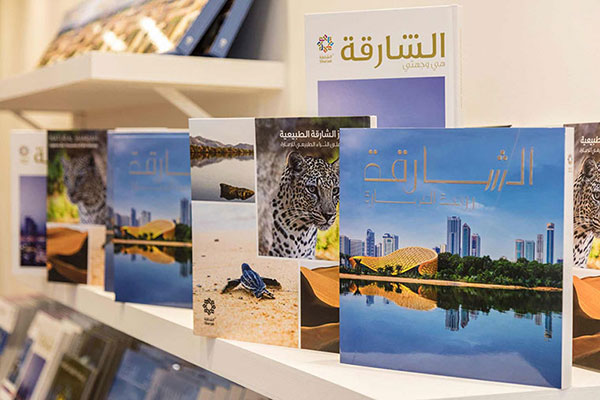 |
| |
|
| |
Al Midfa pointed out that SCTDA coordinated with hotel establishments the arrangements to welcome the delegations of participants and visitors prior to the launch of the exhibition to ensure they are provided with the best services and facilities during their stay in the Emirate.
Themed ‘A World Inside My Book,’ the forthcoming 36th edition of SIBF will see the participation of 1,650 publishing houses from 60 countries. More than 1.5 million titles will be on display throughout the 11-day celebration of literature, knowledge and culture. Spread across 14,625 square meters, this year’s edition will feature 393 celebrated guests from 48 countries who will take part in more than 2,600 events. |
| |
|
| |
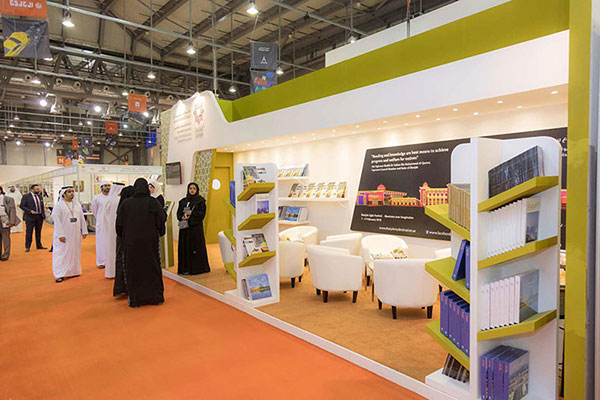 |
| |
|
| |
The Sharjah International Book Fair is the largest of its kind in the Middle East, a registered member of a number of international organizations such as the Afro-Asian Books Council and the Arab Publishers Association and is recognized by the International Publishers Association. It is a unique annual opportunity for publishers, distributors, authors and senior organizers of international exhibitions to come together and exchange information and experiences. |
| |
|
| |
Sharjah, November 5, 2017 |
| |
|
| |
|
| |
|
| |
|
| |
|
| |
|
| |
|
| |
GETEX Autumn 2017 opens doors to more than 5,000 learners keen to take up higher education |
| |
|
| |
Leading education event throws spotlight on occupational & industrial skills,
continuing education & professional development |
| |
|
| |
Gulf Education and Training Exhibition (GETEX) Autumn Edition 2017, the latest edition of the leading student recruitment platform in the Middle East and Asia, has opened today (Wednesday, November 1, 2017) at Hall 5 of the Dubai International Convention and Exhibition Centre to help more than 5,000 learners around the region find the right educational choice from over 600 courses. |
| |
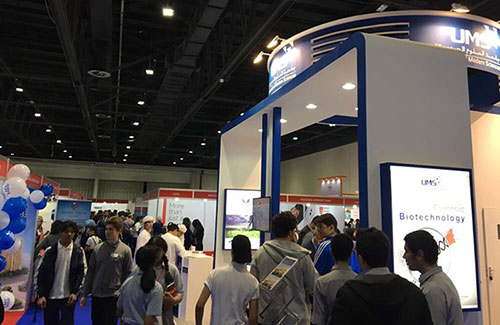 |
| |
|
| |
The region’s most trusted event for higher education features a wide variety of study streams from over 50 regional and international universities located in eight countries, which are set to open their admissions between November 2017 and April 2018. The courses are focused on occupational and industrial skills, continuing education courses and other professional development offerings. |
| |
|
| |
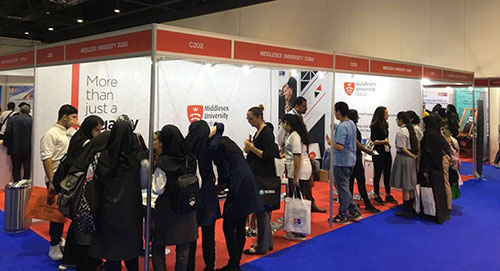 |
| |
|
| |
Anselm Godinho, Managing Director, IC&E and organizer of GETEX, said: “We are excited to present to students and parents the range of new courses and career options they can choose from in this year’s Autumn Edition of GETEX. Universities are here to address student’s concerns and present their course options to learners aspiring to study further. Admissions officers and education counsellors are ready to offer them career guidance on the appropriate program, including advices on scholarship opportunities.” |
| |
|
| |
For more information, please visit: http://www.mygetex.com/ |
| |
|
| |
Dubai, November 1, 2017 |
| |
|
| |
|
| |
|
| |
Under the patronage of
H.H. Sheikh Mohamed bin Zayed Al Nahyan |
| |
|
| |
The Abu Dhabi Department of Education and Knowledge (ADEK) has announced that the
7th edition of the Abu Dhabi Science Festival (ADSF)
will be held under the patronage of H.H. Sheikh Mohamed bin Zayed Al Nahyan,
Crown Prince of Abu Dhabi and Deputy Supreme Commander of the UAE Armed Forces,
and take place simultaneously at both Khalifa Park and the Al Ain Zoo
from the 9th to the 18th of November 2017. |
| |
|
| |
The 7th ADSF Edition will bring together 40 brand-new activities out of a total of 71 promoting the spirit of innovation and science among children such as ‘Imaginary Playground’ and ‘Water Robot.’ Activities that have drawn a huge turnout in previous years – including ‘Dig-up-a-Dinosaur’ and ‘The Secret Life of Coral’ – are returning. More than 40 per cent of the events this year are provided by local science education organizations to ensure a memorable educational experience for visitors and participants. Organizers aim to spark the curiosity of children and motivate them to choose scientific paths in the future.
Today’s Press Conference was attended by H.E. Dr. Ali Al Nuaimi, ADEK’s Chairman; Mr. Adel Ahmed Albuainain, Chief Executive Officer of Dolphin Energy Limited; Dr. Yousef AlShaiba Alsheryani, Advisor to ADEK’s Chairman; Eng. Sanad Humaid Ahmed, Deputy Chairman of the Innovation Committee at ADEK; and other senior officials from the public and private sectors.
H.E. Dr. Al Nuaimi praised the patronage of H.H. Sheikh Mohamed bin Zayed Al Nahyan for the Festival since its inception. He said that the country’s wise leadership is keen to develop human capital and support all initiatives and educational projects that enhance creativity and innovation. He added that ADSF complements national efforts to develop a new generation of outstanding talents in the Science, Technology, Engineering and Mathematics (STEM) field that lead to the transition of a competitive knowledge-based driven economy. |
| |
|
| |
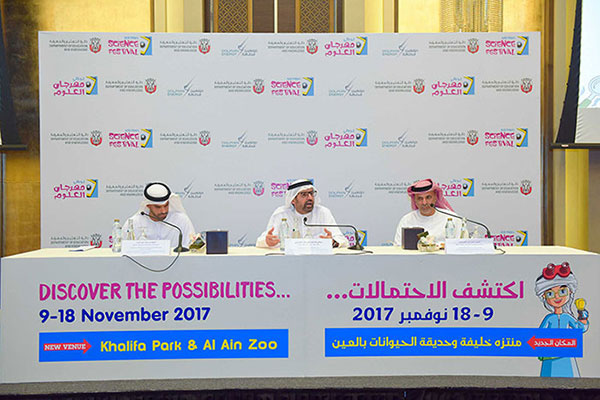 |
| |
|
| |
ADEK’s Chairman added that the new edition offers a rich schedule of unique activities and events developed for two distinct locations - Khalifa Park and the Al Ain Zoo - based on an approach that stirs curiosity while providing youth with a productive, interactive and innovative learning experience that encourages them to build successful careers in science.
Commenting on the company’s sponsorship of the event, Mr. Adel Ahmed Albuainain, Chief Executive Officer, Dolphin Energy Limited, said: “The Abu Dhabi Science Festival has become an important platform for enlightening the UAE’s young minds on the importance of science and encouraging them to pursue productive careers in STEM subjects. This is the seventh year of our sponsorship and we are honored to continue to be a part of this initiative’s sustained growth.”
Mr. Albuainain added: “Khalifa Park has been chosen as the primary location of this year’s festival. This new venue will provide more space for us to provide better experiences and we expect to welcome the biggest and most proactive crowds this year thanks to the new site.” |
| |
|
| |
ADSF is a unique award-winning annual event that contributes to the competency of a new generation of innovators in the STEM fields. It has been attended by over half a million visitors and supported by more than 50 sponsors since its inception and complements the UAE’s science curriculum as well as ADEK’s focus on promoting innovation and discovery especially among young learners.
ADSF, the largest celebration of science in the region, promotes community interest in STEM areas through various formats such as interactive exhibits, lively workshops and entertaining shows. It is specifically geared towards children aged five years old and above who embody the next generation of scientists, technologists, engineers and innovators.
Organized school tours are an essential part of the festival, giving school children the opportunity to attend various events accompanied by their teachers. Other activities also enable participants to learn science in a fun and memorable way.
ADEK is coordinating with 15 universities and academic and scientific institutions across the UAE to be part of the event. More than 1,000 higher education students volunteered to help present the festival – including ADSF alumni who will deliver workshops and shows in an engaging and distinctive manner to inspire the new generation of future scientists. |
| |
|
| |
ADEK is working closely with the Edinburgh International Science Festival to design and develop the content of ADSF 2017 which is an ideal platform for promoting community participation and educating the public about the importance of STEM areas in an interactive and entertaining environment.
ADEK is organizing the 7th annual Abu Dhabi Science Festival in collaboration with major government and private entities such as Dolphin Energy (Presenting Sponsor), Mubadala and Emirates Transport (Affiliate Sponsors), Emirates Nuclear Energy Corporation (Content Sponsor), Abu Dhabi Media (Exclusive Media Partner), Marina Mall and Dalma Mall (Mall Partners) and several local universities. Interested parties can obtain festival information, book workshops and purchase tickets in advance electronically via ADSF’s website, www.abudhabisciencefestival.ae, or through a new downloadable official ‘ADSF’ mobile app.
The new festival location, Khalifa Park, is an easily accessible recreational landmark in the city of Abu Dhabi stretching on the East Ring Road. It spans 500,000 square meters and is adjacent to major communities such as Khalifa City, Bain al Jessrain, Al Maqta, Abu Dhabi Gate City, and Zayed City. Al Ain Zoo, on the other hand, provides a family-friendly atmosphere for ADSF’s world-class entertainment and informative science-inspired activities. |
| |
|
| |
For more information visit: https://www.abudhabisciencefestival.ae/ |
| |
|
| |
About the Abu Dhabi Department of Education and Knowledge
The Abu Dhabi Department of Education and Knowledge was established with reference to the Amiri decree issued in September 2017, to change the name of the Abu Dhabi Education Council to the Abu Dhabi Department of Education and Knowledge (ADEK).
ADEK’s main role is to sustain Abu Dhabi’s leading position as a socio-economic hub with emphasis on nurturing future leaders via a cutting-edge national education curriculum which incorporates high quality learning outcomes, while promoting a culture of creativity, sustainability and excellence, with focus on developing human, social and economic capabilities.
Dolphin Energy Limited
Dolphin Energy Limited was created to develop substantial energy projects throughout the GCC and to create long-term economic wealth and new business opportunities for GCC citizens, far into the future.
Dolphin Energy’s major strategic initiative, the Dolphin Project, involves the production and processing of natural gas from Qatar’s North Field, and transportation of the dry gas by sub-sea export pipeline from Qatar to the UAE, which began in July 2007.
The long-term customers for Dolphin gas from Qatar are ADWEC (Abu Dhabi Water & Electricity Company), DUSUP (Dubai Supply Authority) and OOC (Oman Oil Company). Each has signed a gas supply agreement with Dolphin Energy for 25 years. In addition, SEWA (Sharjah Electricity & Water Authority) and RAK Gas LLC have also signed separate, long term agreements.
Dolphin Energy is owned 51 percent by Mubadala Development Company, on behalf of the Government of Abu Dhabi – and 24.5 percent each by Total of France and Occidental Petroleum of the USA. Detailed information about Dolphin Energy can be found on: www.dolphinenergy.com |
| |
|
| |
Abu Dhabi, October 16, 2017 |
| |
|
| |
|
| |
|
| |
International Business Expertise to Drive
Salford’s Abu Dhabi Vision |
| |
|
| |
The University of Salford has brought together some of the United Arab Emirates’ (UAE) leading minds in business, media, education and the third sector to be part of its international UAE Advisory Board (UAE-AB).
The Advisory Board was launched recently during its inaugural meeting. The board will provide advice and guidance supporting the University’s work in Abu Dhabi and the wider region. The combined expertise of the board will help to support and develop the University’s long-term strategy and help Salford better understand the local needs and priorities.
The board will be made up of up to 20 senior Emirati and international representatives with expert knowledge in one or more of the University’s priority areas, which coincide with that of the Abu Dhabi 2030 Economic Vision. These areas include learning and teaching, research, enterprise, economic and social impact. Currently there are 14 members.
UAE-AB will be chaired by Dr Alaa Garad, Director of the Emirates Centre for Organisational Learning and CEO of Investors in People UAE (ECOL). Like many on the board, Dr Garad is a University of Salford Alumnus, after obtaining his PhD in Organisational Learning from the University. The University’s Vice Chancellor, Professor Martin Hall, and Pro Vice Chancellor (International Priorities), Professor Amanda Broderick, will be vice chairs.
The additional members are:
- Talal Al Aufy, CEO, Oman Trading International
- Dr Ahmed Al Jarwan, General Manager, Etisalat Real Estate
- Rafi Baghdjian, COO, Shell Abu Dhabi
- Paul Baker, Regional Finance Director (CAMEAT), Compass Group PLC
- Paul Maddison, Partner & UAE Head of Client Service (Cost & Commercial Management), EC Harris International Ltd
- Jan Bladen, Executive Adviser and Programme Leader at Abu Dhabi Global Market (ADGM);
- Bob Hope, Chief Executive Officer, SSH
- Mark Jessel, Director, British Council UAE
- Mark Rix, Chief Executive Officer, Associated Newspapers (7 Days in UAE)
- Mamoon Sbeih, Managing Director (Arab Region), APCO Worldwide
- Clare Woodcraft-Scott, Chief Executive Officer, Emirates Foundation for Youth Development
|
| |
|
| |
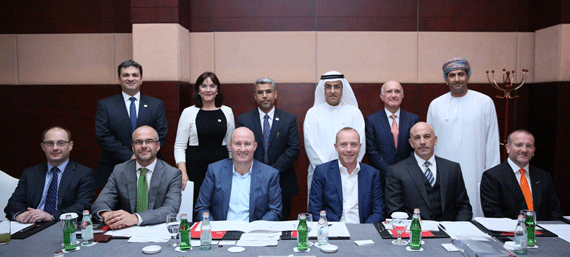 |
| |
|
| |
Associated Newspapers CEO, Mark Rix, said: "Having gained an MBA from the University of Salford it was naturally exciting for me to be invited to join the UAE Advisory Board.
“The expansion of the University in the Middle East is a very positive development which presents outstanding opportunities for students from the region to further their education within a world class institution. The wider possibilities for public and private sector collaboration with the university are considerable and this is of equal interest. The long term effect of Salford University’s investment in this region lies in the positive contribution to the development of a knowledgeable and competitive economy.”
Shell Abu Dahbi COO, Rafi Baghdjian, added: “It is great that the University has set up an Advisory Board to support its efforts to better serve the UAE. I am honoured to be a member and looking forward to working with my fellow members who have a diverse working background and skillset which, I am sure, will lead to rich discussions and outcomes.” |
| |
UAE, November 11, 2014 |
| |
|
| |
| |
|
| |
“Our grandfathers and ancestors
have left a wealth of cultural heritage
we are proud of.”
Sheikh Zayed bin Sultan Al Nahyan |
|
| |
|
| |
| |
|
| |
On the second day of "Dubai World Hospitality Championship"
"Emirati Hospitality: Customs and Traditions"
a documentary book on the local heritage is to be launched |
| |
|
| |
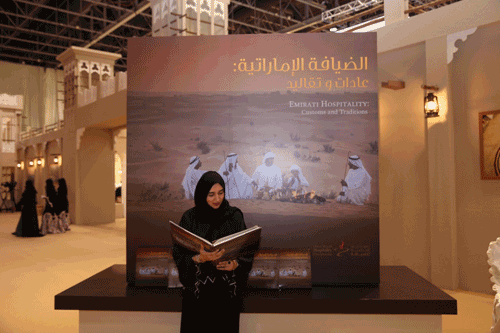 |
| |
|
| |
The book allows its readers to taste the distinctive tastes of Emirati cuisine
It unveils the genuine traditions and rituals of Gulf hospitality
Ahmed bin Hareb: The book aims to documenting the elements of Emirati hospitality
Alia' Al Shankiti: The book is considered a reference for young generations |
| |
|
| |
On the sidelines of Dubai World Hospitality Championship, Zaabeel Palace Hospitality launched a book documenting the local heritage under the title "Emirati Hospitality: Customs and Traditions". The book demonstrates principles of Emirati Hospitality, from Bedouin-style welcoming, desert-influenced drinks, cooking instruments, wedding clothes, and other genuine Emirati customs. Talking about the different eras of Emirati heritage, the first edition of the book was signed by H.H. Sheikh Mansoor Bin Mohammed Bin Rashid Al Maktoum.
Commenting on the launching of the unique book, H.E Ahmed bin Hareb, President of DWHC, stated that the traditions of UAE's unique hospitality has been carried on from one generation to the following for centuries, deep-engraved customs and families food recipes have been inherited verbally to memorize them, and thus the "Emirati Hospitality: Customs and Traditions" book has managed to document these crucial aspects to demonstrate the essence of original Emirati hospitality and share it with the world.
The Dubai World Hospitality Championship, which was launched under the patronage of His Highness Sheikh Hamdan bin Mohammed bin Rashed Al Maktoum, Crown Prince of Dubai, has been established to celebrate and preserve our traditions, and at the same time, improve the innovation in hospitality sector, added bin Hareb. We hope that the book would achieve its goal in documenting the elements of Emirati hospitality through its texts, photographs, and illustrative and informative drawings.
H.E. bin Hareb assured that collaborated efforts of hospitality sector in the UAE has achieved a lot, as the number of chefs and restaurants is increasing and hotels are competing on providing Emirati hospitality, to give food enthusiasts a chance to taste the unique flavors of Emirati culinary and enjoy the warm and generous Emirati hospitality.
"Emirati Hospitality: Customs and Traditions" reviews hospitality traditions in the Arab Gulf, pointing the different historic, cultural and geographic connections between Arab Gulf states (United Arab Emirates, Kingdom of Saudi Arabia, Kuwait, Qatar and Sultanate of Oman), including language, religion and identity of each, however, they share many similarities regarding their culture, justified partially by the life of their ancestors as Bedouin tribes in the region. The book, therefore, relates the traditions of Gulf hospitality to a complicated group of rituals and courtesies that are based on ancient tribal customs.
Alia' Rashed Al Shankiti, Events Manager at DWHC, noted that the book is considered a reference for young generations to learn about the customs of our ancestors and to revive it in them, particularly within the rapid changes in hospitality sector. Al Shankiti reviewed the contents of the book, which are divided into three chapters (Emirati Hospitality, Emirati Culinary, and Chefs and Kitchens). The first chapter points to Emirati families receiving their guests with genuine customs that originate to previous times when most families had very few belongings to enable them to prepare a generous meal even to one guest. Nevertheless, these families managed to give their guests a very warm welcome and offer them all possible means of comfort, regardless of the social status or geographic location of the hosting Emirati family. They were hospitable and received their guests with Arabic coffee, Fuala, aloes and frankincense.
Modern Emirati family reflects the balance between tradition and modernism, where many local houses now consist of a "Mabrez" (Majlis), a reception room equipped with traditional Emirati seating, where guests can relax and lean on "Tickee" (pillows), and has chairs and Matareh (matresses).
The book assured that some customs and traditions still exist as before, such as drinking coffee and eating fresh Fuala and desserts at the beginning of each visit, where such customs are considered an essential element of local manners and permanent symbol of Emirati hospitality. Neighbors, families and friends still exchange food dishes and drinks as presents, and rich families still donate food generously to mosques and charities, especially in Ramadan. Public water fridges are a common sight in front of local homes to ease the thirst of passersby and workers on the street. These practices and other are vivid evidence to the traditional and generous Emirati hospitality realized in modern everyday life.
Frankincense and Fuala
The first chapter of "Emirati Hospitality: Customs and Traditions" discusses frankincense, Fuala, Majlis and traditional clothing. The book gives an explanation and the history of inventing frankincense and their uses. The natural scents of sandalwood, rose, henna, saffron and musk are thousands of years old, however they are still present in the UAE and in other areas in the Arab Gulf. They are an integral part of hospitality, as they are used not only in special occasions, but also in everyday life. Aloes and frankincense are part of every social meeting. Women pass a tray of frankincense amongst them in their gatherings to perfume their guests when they leave.
Fuala demonstrate the originality and authenticity of Emirati hospitality. Fuala are a diversity of miniature plates that are given to guests as they arrive, and they are a symbol of hospitality and honoring of the guest. Before fridges, microwaves and heat-preserving Tupperware where invented, Emirati families used to keep the flames under food for a long period, so they can offer their guests a warm fresh Fuala whenever they come.
"Emirati Hospitality: Customs and Traditions" talked about the Mabrez (Majlis), and described it as a main element in Emirati hospitality. The Mabrez is both a location and a social institution, and a milestone in such culture. It is taken as social, intellectual and administrative institutions, that give chance to Emiratis to speak directly to their elderlies and sheikhs, and contributes in reinforcing unity amongst the community by hosting public discussions for many generations.
In the current political system of the UAE, governors still open the doors of their Majalis for the public, especially in general occasions, and as such act many Emirati families. Emirati homes usually consist of two Majalis, one for males and the other for females, and able to host large numbers of guests. Whether they are luxurious or humble, these Makalis reflect an authentic past and remain as the backbone of local community hospitality.
Traditional Clothing
Traditional clothing are one of the most vivid external manifestations of Emirati culture and national identity, whether they worn in public or private locations, daily or on special occasions. These clothing does not only reflect the principles of Islam through their reserved looks, but are also a commitment to local heritage and national pride. The book also demonstrated the stitching details and ancient embroidery of these clothes.
Emirati Culinary
The second chapter of "Emirati Hospitality: Customs and Traditions" discusses the Emirati culinary art with the absence of modern technologies, such as electricity, flowing water, A/Cs and other home appliances. Cooking a meal for a whole family in the past was a challenge to all women across the Arab Gulf. In many occasions, humble homes did not include an independent kitchen, women used to cook in their home's yard using char coal kitchens (Tanur) and barbeque stoves. It was a very difficult mission, especially during summer, as temperatures and humidity are high. Sometimes, food elements were absent from the market for weeks, or people could not afford them. Food used to be distributed amongst neighbors, families, friends and even strangers, and to charity.
The second chapter of the book includes traditional cooking equipment, traditional recipes, Emirati drinks and local commodities. The book notes that Emirati culinary is a fascinating lens, through which portions of the UAE history are displayed. The existence and absence of certain equipment reflects the economic and social development in the region. The absence of such old tools from Emirati kitchens refers to the rapid changes that occurred in the State, but in order to preserve such history, each culinary tool deserves to be documented according to individual Emirati hospitality, as it is a main tool in presenting hospitality as required.
Traditional Recipes
"Emirati Hospitality: Customs and Traditions" highlighted a selection of traditional Emirati plates that reflect part of the flavors and cooking methods adopted in local culinary. The list includes main dishes such as, Fokat Lahem, Matban Lahem, Jasheed, Salounat Lahem, Al Maleh, Fokat Samak, Khameer, and Khanfaroush, in addition to salads and desserts.
Emirati Drinks
The book discussed Emirati drinks in details, as fresh drinks, cold and hot, are considered an integral part of local culinary and hospitality. Emirati coffee is offered all day long, in addition to some salty and sweet snacks. Popular hot drinks include sweetened tea, various types of flavored milk and Namlet, as well as added herbs for their health benefits (Pleases refer to the informative drawing in following pages). During hot summer days, the popularity of fresh fruit juice is not a surprise, as small stores offer a wide selection of colorful fruit juices.
Amongst the most famous juices is "Sharbat", which is an old Arab name for drinks. Other famous juice names were borrowed from English and from trademarks of concentrated juices, such as "Vimto" (produced in 1908) and "Tang" (produced in 1957) and is highly popular, especially in Ramadan. These names are not only highly famous in Arab Gulf states, but in also in all Arab states.
Traditional Products
The Section of traditional products in "Emirati Hospitality: Customs and Traditions", includes some essential long-living food products that Emirati chefs tend to prepare and store in large amounts, to use them later in a wide selection of plates. These products arrange from spices to dried and fatty elements. These Emirati food supplies have been used in local culinary for several generations even before fridges were sold in the region, especially that they are made of simple components, are easy to store, have a long expiry period that lasts for months. These are essential attributes for food used by ancestors and nomads.
Preserving these products as supplies for long trips was a matter of life and death to those who crossed desserts and sailed in sea when food becomes scarce and weather gets dry. Nowadays, these products still exist and are used in most Emirati homes. |
| |
Dubai, 31st October, 2014 |
| |
| |
|
| |
"The Real Asset of any Advanced Nation is its People,
especially the Educated Ones,
and the Prosperity and Success of the People are
Measured by the Standard of their Education."
Sheikh Zayed bin Sultan Al Nahyan
|
|
| |
|
| |
| |
|
| |
Study One of the World's Most Popular
MBA Programmes in Arabic |
| |
|
| |
Edinburgh Business School, the Graduate School of Business of Heriot-Watt University,
Available in Arabic .... Organisational Behaviour course.

|
| |
|
| |
| |
|
| |
All Rights Reserved, ArabianCampus.com © Peter Krol |
| |
|
|
|
